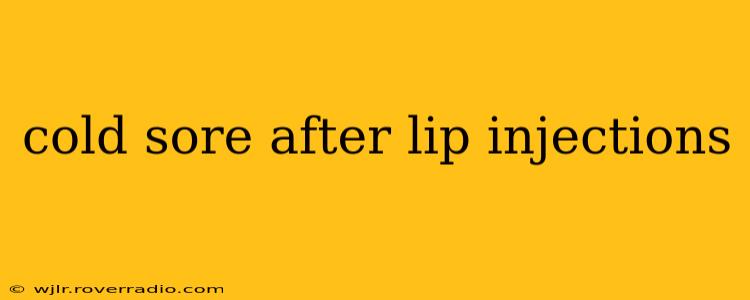Lip injections are a popular cosmetic procedure to enhance lip volume and shape. However, one potential side effect that can occur after lip injections is a cold sore. This article explores the causes, prevention strategies, and treatment options for cold sores following lip injections. Understanding this complication can help both patients and practitioners manage expectations and minimize the risk.
What Causes Cold Sores After Lip Injections?
Cold sores, also known as fever blisters or oral herpes, are caused by the herpes simplex virus (HSV). Most people are infected with HSV-1 (the type that usually causes oral herpes) at some point in their lives, often during childhood. While the virus may lie dormant, certain triggers can reactivate it, leading to a cold sore outbreak. Lip injections, while not directly causing the virus, can trigger a reactivation in individuals already carrying the HSV-1 virus.
Several factors contribute to this reactivation:
- Trauma to the lip area: The injection itself introduces minor trauma to the lip tissue. This trauma can be a sufficient trigger for the dormant virus to become active.
- Stress: The procedure itself, as well as the anticipation leading up to it, can increase stress levels. Stress is a known trigger for cold sore outbreaks.
- Immune system compromise: The injection process, while generally safe, can temporarily compromise the immune system's ability to suppress the virus. This makes the individual more susceptible to a reactivation.
- Hormonal changes: Fluctuations in hormone levels can influence the immune system and potentially increase susceptibility to cold sores.
Is it Normal to Get a Cold Sore After Lip Fillers?
While not "normal" in the sense that it doesn't happen to everyone, experiencing a cold sore after lip injections is not uncommon. The virus is prevalent, and the procedure creates conditions that can trigger a reactivation. It's crucial to inform your injector of any history of cold sores before the procedure.
How Can I Prevent a Cold Sore After Lip Injections?
Preventing a cold sore outbreak after lip injections involves proactive measures:
- Disclosure of HSV history: Before the procedure, inform your injector about any history of cold sores or oral herpes. They can then take appropriate precautions.
- Antiviral medication: Your doctor may prescribe an antiviral medication (like acyclovir or valacyclovir) prophylactically before and after the procedure to suppress the virus and reduce the risk of an outbreak.
- Stress reduction: Practice stress-reducing techniques before and after the procedure, such as meditation or deep breathing exercises.
- Maintaining good hygiene: Avoid touching your lips unnecessarily and practice good hand hygiene to prevent the spread of the virus.
Can Lip Injections Cause Cold Sores?
Lip injections themselves do not cause cold sores. They merely trigger the reactivation of the already present herpes simplex virus in susceptible individuals. The virus is the causative agent, and the injection serves as a trigger.
What is the Treatment for a Cold Sore After Lip Injections?
If a cold sore develops after lip injections, treatment typically focuses on managing symptoms and preventing complications:
- Antiviral medication: Oral or topical antiviral medications can help shorten the duration and severity of the outbreak.
- Over-the-counter remedies: Over-the-counter creams or ointments containing analgesics and anti-inflammatory agents can help manage pain and discomfort.
- Cold compresses: Applying cold compresses to the affected area can help reduce swelling and pain.
- Avoid touching the sore: Touching the cold sore can spread the virus, so avoid touching it and wash your hands frequently.
How Long Does a Cold Sore Last After Lip Fillers?
The duration of a cold sore outbreak varies, but typically lasts 7-10 days. With appropriate treatment, the duration may be shortened.
When Should I See a Doctor After a Cold Sore Outbreak Post Lip Injection?
You should contact your doctor or the injector if:
- The cold sore is severe or unusually painful.
- The cold sore doesn't improve after a week of treatment.
- You experience signs of infection such as increased redness, swelling, or pus.
- You develop a fever or other symptoms of illness.
By understanding the potential for cold sores after lip injections and taking proactive measures, both patients and practitioners can minimize the risk and effectively manage any outbreaks that may occur. Remember, open communication with your medical professional is key to a successful and safe outcome.
